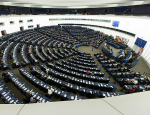Expert comment

22 June 2016
The 'Cracking Law' podcast is produced by expert researchers from QMUL's School of Law. The first episode focuses on European Union law, and episode two looks at Brexit.

17 June 2016
Professor Philip Cowley writes about the role of MPs in their constituencies. He says: "It is a difficult, time-consuming, at times frustrating and at other times rewarding, part of the job. It should not also be dangerous."

4 May 2016
Eric Henize, Professor of Law and Humanities, considers the crisis facing the British Labour Party, and asks - what is antisemitism?

28 April 2016
Chris Millard, Wellcome Trust Medical Humanities Research Fellow, reviews the film Demolition (2015) in the context of his work as a historian of the emotions.

28 April 2016
Lizzie Barmes is Professor of Labour Law at Queen Mary University of London. She is author of Bullying and Behavioural Conflict at Work, recently published by Oxford University Press.

18 April 2016
It might have cost £9.3 million, but will the government's EU leaflet sway many voters? Lindsay Aqui, Phd Candidate, at Queen Mary University of London, looks back to the 1975 referendum and asks whether the experiences of the Wilson government hold lessons for today's campaigners.

29 March 2016
Europe imports more than half of the energy that it consumes, and its supply is vulnerable to regional instability and economic shocks. In a major new book, Professor Rafael Leal-Arcas, shows how the creation of a European Energy Union might be an effective and viable solution to the energy security problems that the European Union (EU) is facing.

16 March 2016
Political to his fingertips or a hard core Tory Chancellor? Professor Tim Bale considers the evolving and mercurial role of George Osborne.

19 January 2016
The UK’s referendum on EU membership may well be one of the main stories of 2016, with the British Prime Minister, David Cameron, recently suggesting that it could be held as early as the summer. Montserrat Guibernau writes on how we can conceive of Euroscepticism in both the UK and other EU countries.

14 January 2016
Dr Rob Knell from QMUL's School of Biological and Chemical Sciences writes how large ornamental structures in dinosaurs, such as horns and head crests are likely to have been used in sexual displays and to assert social dominance, according to a new analysis of Protoceratops.
This is the first time scientists have linked the function of anatomy to sexual selection in dinosaurs.
11 December 2015
Dr Mehrnoosh Sadrzadeh from QMUL's School of Electronic Engineering and Computer Science looks at what it takes to teach an AI how to read natural human languages.

19 August 2015
The Bangkok bomb killed 20 people, injured more than 100, and shook Thai politics, already turbulent, to its core. In this article, Dr Lee Jones, Senior Lecturer in Politics and International Relations, argues: until concrete evidence is produced, we should avoid any rush to judgement, and take both speculation and assignations of blame with a truckload of salt.

18 August 2015
The crisis facing migrants on the shores of Europe shows no sign of abating. As EU member states prevaricate on how to manage a human and political crisis, Dr Jessica Jacobs from QMUL's School of Geography says: "The system is paralysed. To make it move again, hospitality is the key".

29 July 2015
Dr Thomas Dixon, Director of QMUL's Centre for the History of the Emotions, reviews Disney Pixar's Inside Out.

19 June 2015
We all want a quality health service – but what does this really mean? What does quality in healthcare really look like? Dr Deborah Swinglehurst has been exploring this idea for several years, curious to find out what academics, opinion leaders, healthcare professionals and members of the public really understand by the term ‘quality’ in the healthcare context.

19 June 2015
In this article, Professor Julia Hörnle, of QMUL's School of Law, considers the impact and rapid development of face recognition techniques on privacy.

15 June 2015
In this article, Sam Fowles, researcher in international law and politics at Queen Mary University of London, asks whether the European Parliament will 'save us' from the controversial Transatlantic Trade and Investment Partnership (TTIP).

2 June 2015
Professor Peter McOwan, from the School of Electronic Engineering and Computer Science, discusses whether artificial intelligences would actually be able to take over the world, whether they’d want to, and how we'd know if they did.

20 May 2015
Dr Matthias Mauch discusses his recent scientific analysis of the “fossil record” of the Billboard charts prompted widespread attention, particularly the findings about the three musical “revolutions” that shaped the musical landscape of the second half of the 20th century.

27 April 2015
On 24 April 2015, QMUL's Centre for Commercial Law Studies convened a group of legal experts to consider and examine issues around gaming an intellectual property law. In this article, Dr Gaetano Dimita, Lecturer in International Intellectual Property Law, sets out the many legal challenges that emerge from this growing and dynamic sector.
23 April 2015
Sarah Wolff, Lecturer at QMUL's School of Politics and International Relations, examines the tragic events in the Mediterranean and outlines what she describes as failed EU policy in the area of migration.

23 April 2015
Dr Magda Osman, Senior Lecturer in Experimental Cognitive Psychology explores the research behind behavioural economics and looks at its relationship with advertising

25 March 2015
Jessica Jacobs, Research Fellow at QMUL's School of Geography, argues that the systematic neglect of border regions by military-backed governments in the Middle East has enabled the success of extreme terrorist groups in these marginalised areas, resulting in "geographies of hate".

24 March 2015
In an article which originally appeared on The Conversation, Dr Tom Whyntie explains how the world's largest distributed computer grid helped find the Higgs boson and what it'll be doing as the Large Hadron Collider is started up again.

23 March 2015
On the one year anniversary of the Ebola outbreak, Dr Sophie Harman - Reader in International Relations at QMUL - explores the devastating impact on women in affected regions.

19 March 2015
At least 19 people died in a terrorist attack in Tunisia on 18 March 2015. In this article, Dr Sarah Wolff - Lecturer, School of Politics and International Relations - considers the implications for Tunisia "beyond the immediate horror" of the attack, and describes it as "a litmus test for the country’s democratic transition".

26 February 2015
Professor Norman Fenton writes about his role co-presenting a forthcoming BBC Four documentary on climate change and the importance of three key statistics.

25 February 2015
In this blog post, QMUL Lecturer in Digital Media Bob L. Sturm discusses how, like 'Clever Hans' the German horse who appeared to be able to do complex mathematics, music listening programs can appear to work until we start to really test them.

23 February 2015
In this letter, published in the Law Society Gazette, QMUL's Jonathan Griffiths challenges "undue pessimism" about the UK’s imminent legislation on plain packaging.

18 February 2015
In this article, Professor Julia Hörnle - one of the UK's leading experts in online dispute resolution - comments on the recent recommendations from Civil Justice Council's report on ODR. The group, of which Julia is a member, calls for a radical shake-up in how the UK handles low value claims.